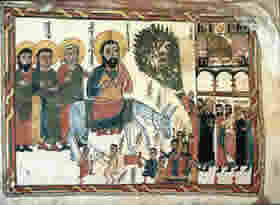Originally published as "They Say There's Another King, One Called Jesus," by Dan Clendenin, The Journey with Jesus blog, November 18, 2013
For Roman Catholics and churches that follow the Revised Common Lectionary, this last Sunday of the liturgical year honors "Christ the King." It's a relative newcomer to the Christian calendar. Pope Pius XI introduced the feast on December 11, 1925 with his encyclical "Qua Primas" (In the first). That papal letter summarizes the Bible's teachings about the kingship of Christ.
According to Pius, Christ the King rules not only over the church, but over all the whole world — if not now, then at the end of time.
 |
Jesus's Triumphal Entry, Medieval Syriac manuscript.
|
Doesn't this feel like a setup for liturgical failure? For the worst sort of triumphalism? If so, blame Paul and not Pius.
Today the language of kingship is outmoded and offensive. There are good reasons for this. We don't live under kings, so the metaphor feels irrelevant. And we're rightly repulsed at how the reigns of kings meant a reign of terror for most subjects — massive wealth and power attained by cruelty and exploitation, which was then passed on by birthright to people who did nothing to deserve it.
Nonetheless, the language of kingship is embedded in the Christian story. The earliest followers of Jesus, and especially his detractors, used the language of kingship to describe who he was, what he said, and what he did.
Unless you want to follow Thomas Jefferson, and snip and clip the parts of the Bible that you don't like — creating a Bible in your own image, we're left with the language of kingship.
As in the game of golf, we're better off to play the Scriptures where they lie. The question then becomes what kingship means.
Continue Reading
Continue Reading
No comments:
Post a Comment